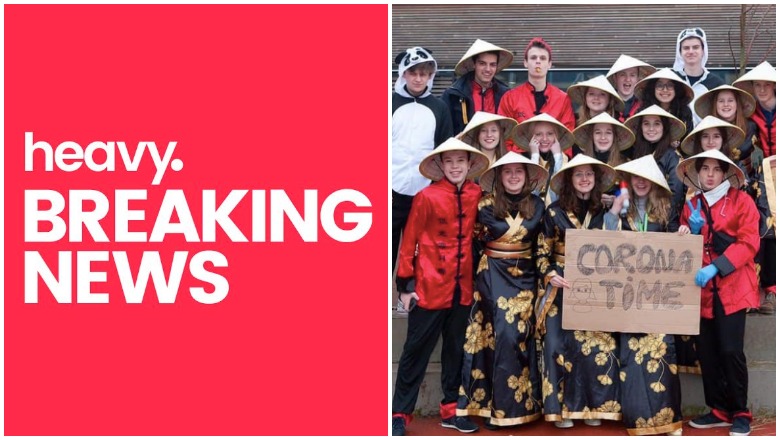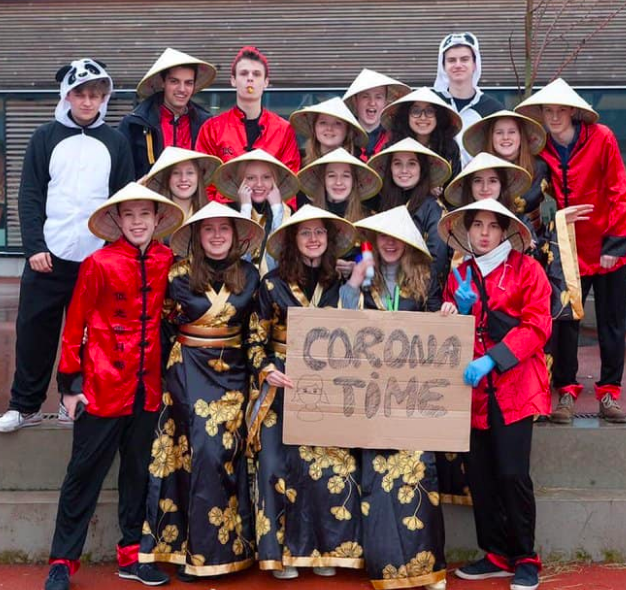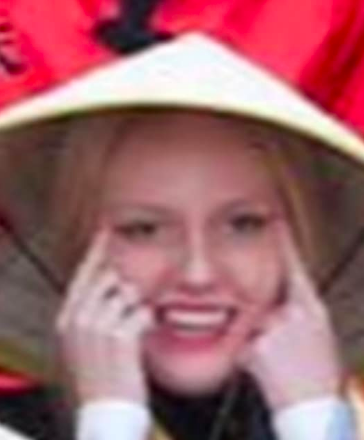
College Waregem This racist "Corona Time" photo was taken by high school students in Belgium.
Apicture of high school students dressed up in racist costumes (some of them intentionally slanting their eyes in a direct mockery of Asian culture) and holding a “Corona Time” sign has prompted an outcry across the world. The picture in question was taken of high school students in Belgium, and posted to the school’s official Instagram and Facebook accounts. The photo has been removed from both accounts. A campus director has since addressed the photo in a brief statement, in which he apologized for the picture.
In the photo, 19 students are pictured dressed in men and women’s stereotyped Asian outfits, with two of them wearing panda costumes. One girl in the second row can be seen slanting her eyes intentionally and laughing. The boy holding the “Corona Time” sign can be seen wearing blue latex gloves, in a direct nod to the coronavirus that has infected over 100,000 people around the world.
That school, Campus College Waregem, has since deleted the photo — but not before several people screenshotted the racist imagery and shared it with others.
Here’s what you need to know:
Racist ‘Corona Time’ Photo Was the Result of a ‘100 Day Celebration’ for Students
Here’s the photo in question that many are condemning, for its racist connection both to Asian culture in general, as well as to Asian culture in relation to the coronavirus:

And here is a zoomed up image of one of the students slanting her eyes, in an apparent effort to imitate Asian people:

None of the high school students have been identified. Many of them might be underage. Still, many people believe there needs to be some sort of response to what appears to be such a dangerously racist photo, especially in relation to the coronavirus outbreak.
According to a Belgian publication, the photo was taken as part of an annual celebration, in which students celebrate the last 100 days of their secondary education. The students in the photo planned to dress up in Asian garb prior to the coronavirus outbreak in Wuhan, but decided to add the “Corona Time” sign, as well as masks, after news of the outbreak spread, as a “playful nod” to the situation in China, the publication reports.
It’s not clear why wearing racist costumes or imitating other cultures in a racist fashion is considered a normal way to celebrate the last 100 days of school.
A campus director for the school spoke to the publication, insisting that the students didn’t intend to offend anyone. “Neither the school team, nor the students in question, have intended to hurt this photo,” director Philip Demuynck said. “We want to apologize explicitly, because we had not correctly estimated the consequences.”
A City in Belgium Was Called Out for its Allegedly Anti-Semitic Parade a few Weeks Ago
Just a few weeks ago, a Belgian city was called out for allowing, and supporting, an anti-semitic parade, in which people dressed as caricatures of Orthodox Jews, wearing large fur hats, long noses, and ant costumes.
Per BBC, the mayor of the city in question, Aalst, said, “It’s our parade, our humour, people can do whatever they want. It’s a weekend of freedom of speech.”
Of course, racist behavior like this is never acceptable — but the “Corona Time” photo is particularly alarming, given how dangerous it is for people to make racist connections between a global pandemic and one specific culture.
Racism against Chinese people in particular has been reported in direct relation to the coronavirus, with some U.S. politicians even falsely calling the pandemic the “Chinese coronavirus.”
Concerns about racism in connection to the coronavirus is so great that the Centers for Disease Control & Prevention directly addresses it on its coronavirus page. The CDC warns, “Fear and anxiety about a disease can lead to social stigma (1) toward people, places, or things. For example, stigma and discrimination can occur when people associate a disease, such as COVID-19, with a population or nationality, even though not everyone in that population or from that region is specifically at risk for the disease.”